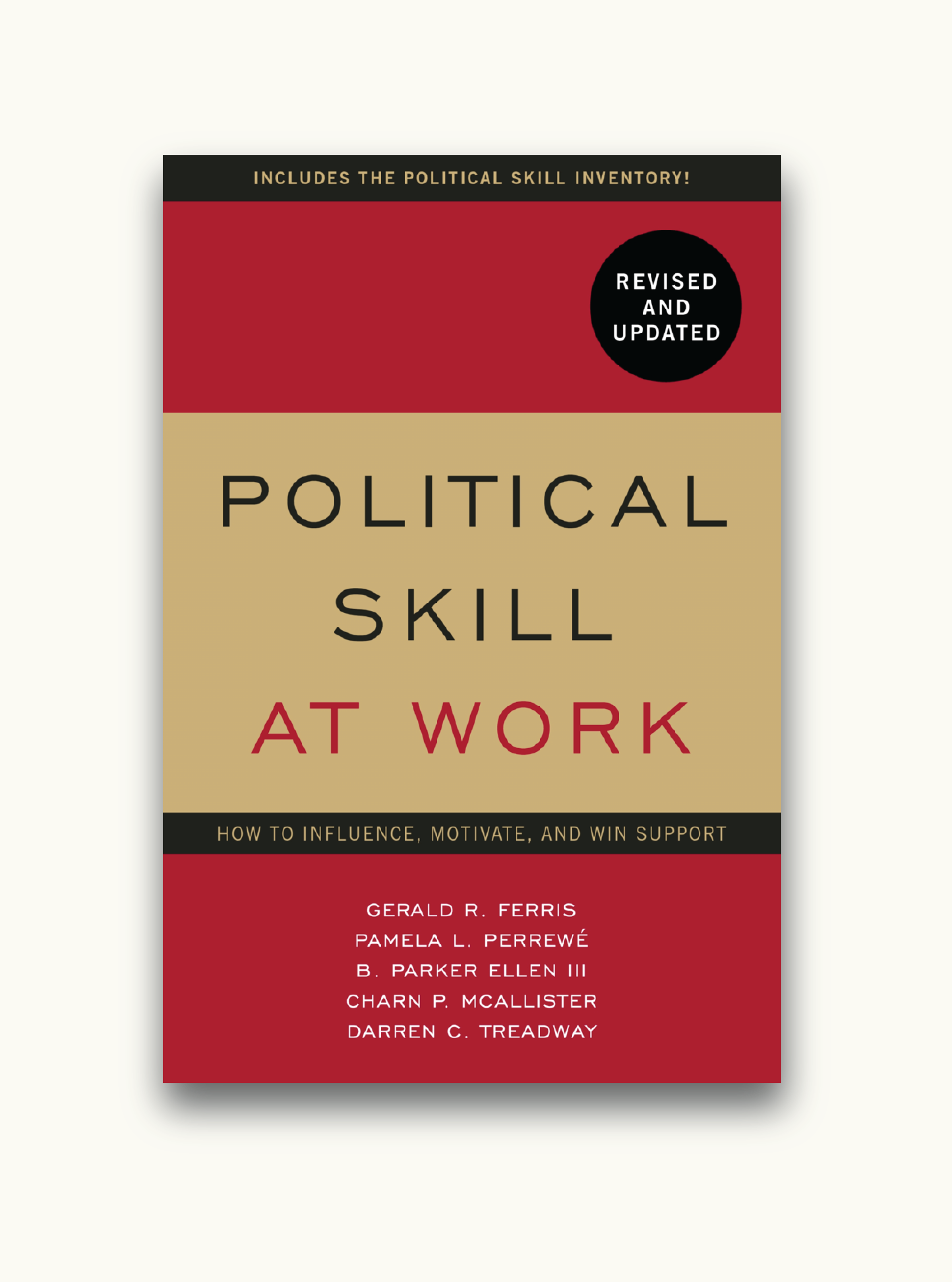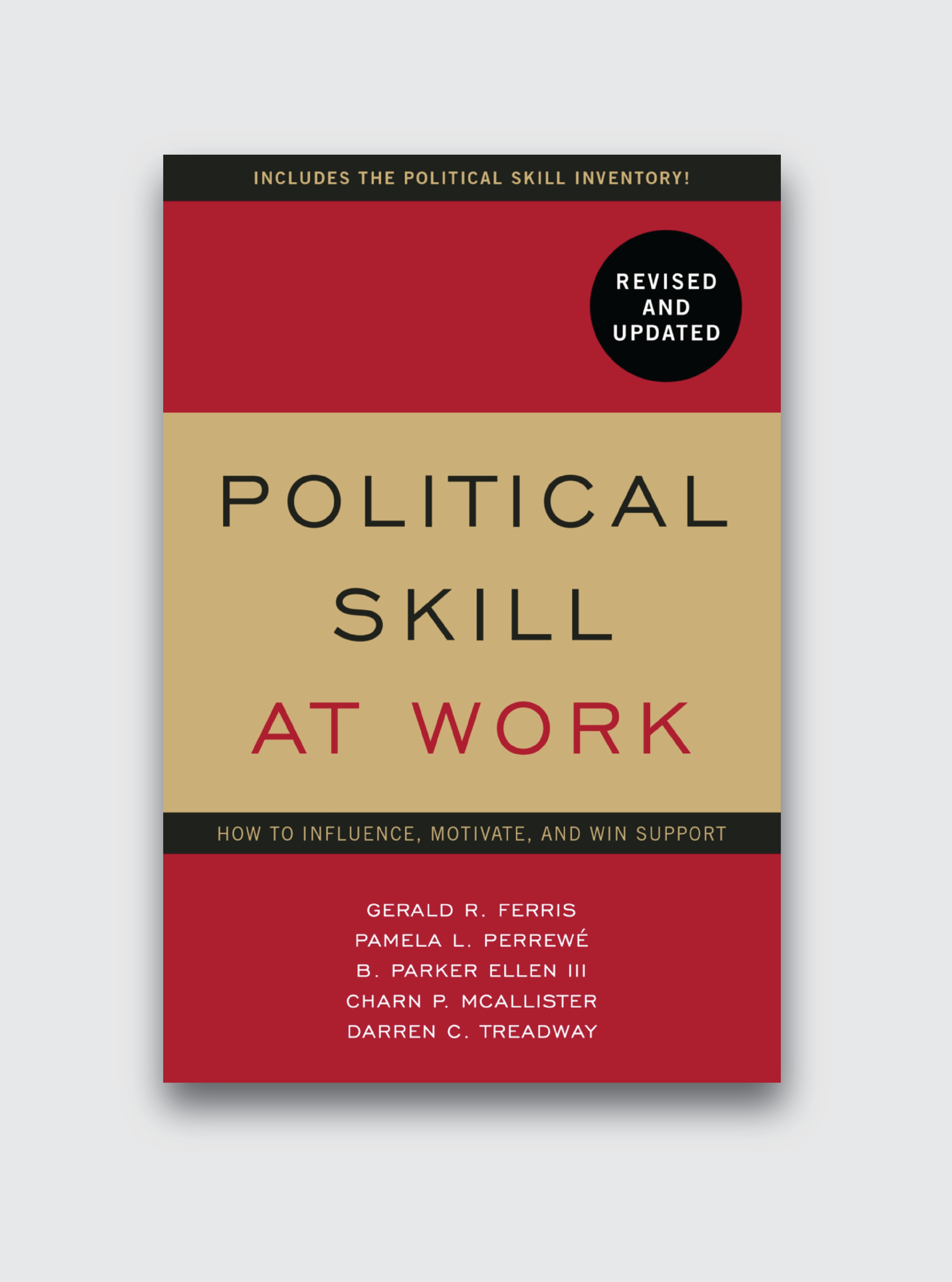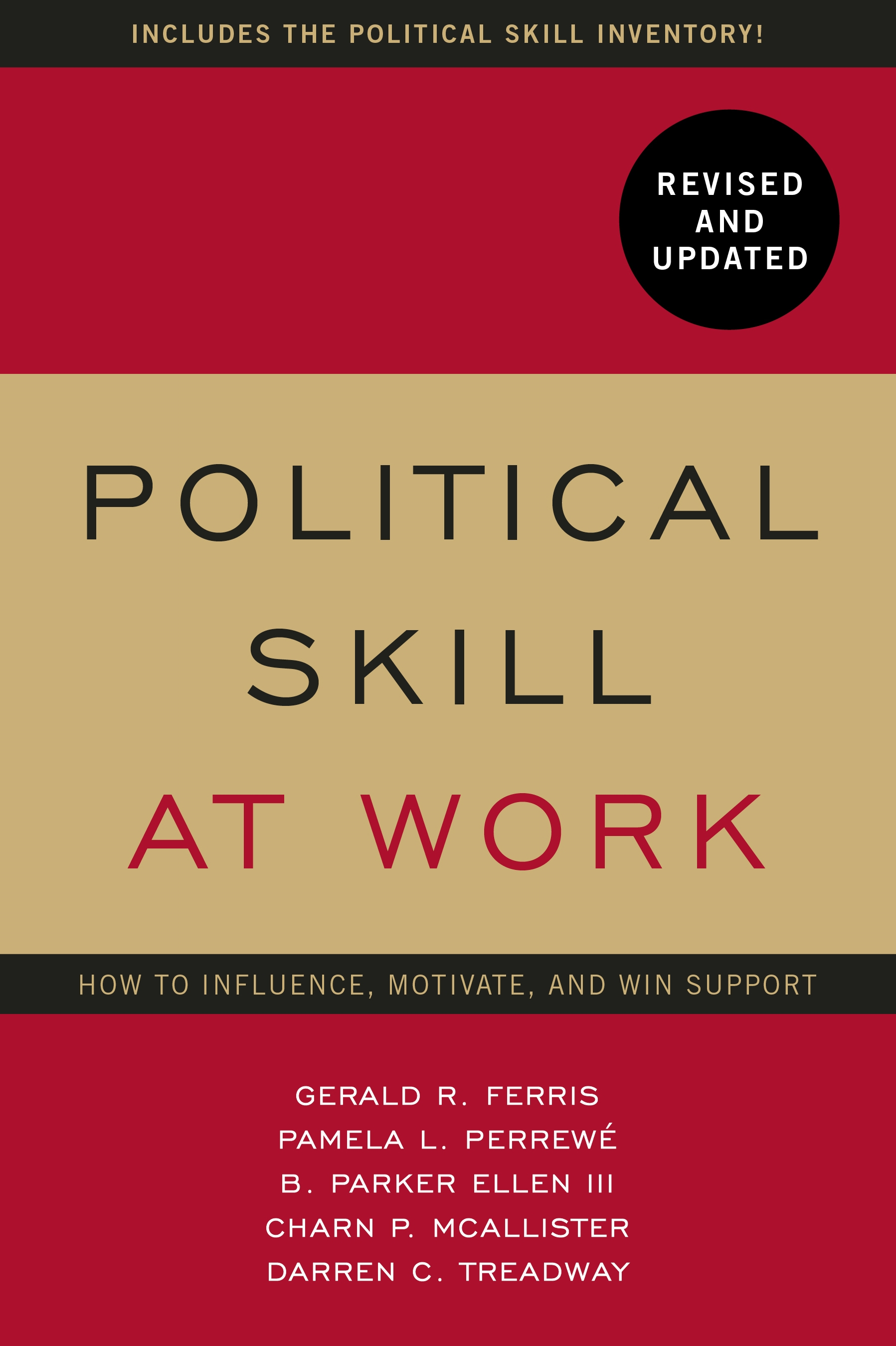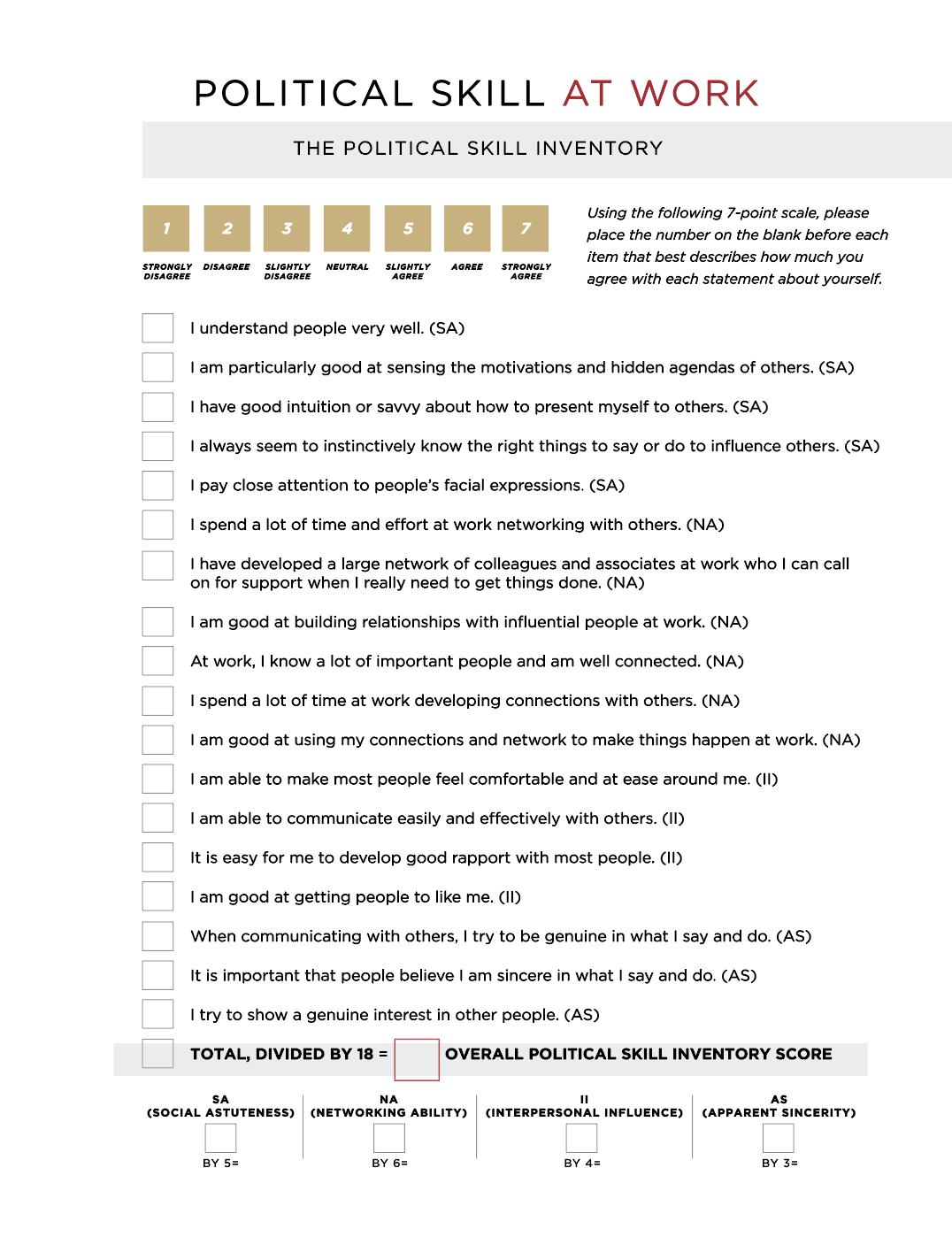revised + updated
political skill at work
How to influence, motivate, and win support. In today’s organizations, career success depends more on political skill – the ability to influence, motivate, and win support from others – than on almost any other characteristic.
“Based on extensive empirical research, Political Skill at Work provides substantive, practical advice for people to assess their political skill, develop it further, and use it effectively. Because organizational politics is, as the authors note, ubiquitous and important, everyone should consume the valuable information this book provides.
Jeffery Pfeffer
Professor in the Graduate School of Business, Stanford University,
and author of Power: Why Some People Have It—and Others Don’t.
About
what iS political skill?
Contrary to the stereotypical perceptions of being political, political skill is about more than manipulation. Yes, it is possible that political skill can be used and to get away with self-serving acts at the expense of others, but at its core it is a characteristic that can facilitate good things for individuals and their organizations. In fact, political skill enables people to build trust and forge positive relationships, and leaders often need it to influence others and access resources critical to their teams’ success.
We have found political skill to be a fascinating concept that we believe can help you excel at work, and we look forward to showing just what it can do for you.
“So, you think office politics is about self-interest and dirty tricks? Think again. Political skill can lead to positive outcomes for you and your organization, such as improving your job performance, influence, reputation, and career prospects.”
David A. Buchanan
Emeritus Professor of Organizational Behaviour, Cranfield University School of Management
THE BOOK
PART I
Understanding political skill
Chapter 1: Surviving and Thriving in the Political Arena
Chapter 2: Opportunity Recognition, Evaluation, & Capitalization
Chapter 3: Developing Your Political Skill
Chapter 4: Political Will: The Motivation to Succeed
PART II
political skill & career success
Chapter 5: Getting the Job
Chapter 6: Maximizing Your Job Performance and Career Success
Chapter 7: Enhancing Your Reputation
Chapter 8: Managing Job Stress
PART III
political skill in specific contexts
Chapter 9: Building Social Networks
Chapter 10: Negotiating Effectively
Chapter 11: Influence through Digital Communications and Social Media
Chapter 12: Leadership and Team Performance

read the intro
If you ask people why they didn’t get a job or promotion they wanted, you shouldn’t be surprised to hear something along the lines of, “it was a political decision.” The specific translation of their response may vary depending upon the circumstances, but the core message remains the same…
READ MORE +
Introduction: Politics is not a Dirty Word
If you ask people why they didn’t get a job or promotion they wanted, you shouldn’t be surprised to hear something along the lines of, “it was a political decision.” The specific translation of their response may vary depending upon the circumstances, but the core message remains the same. For example, they could mean that the boss was playing favorites in the team by promoting the person closest to them, or that they gave the job to an old college buddy despite a lack of qualifications. Regardless, what they’re trying to communicate is that they feel like the decision was unfair. They believe someone got a job or promotion that wasn’t deserved, and on top of that, it was at the expense of someone who did deserve it (usually, the person you asked). So, when people say something was “political,” they’re usually trying to communicate that something didn’t go their way and that they don’t think it was fair.
You might have said, or at least thought, something like the above at times during your career, as well. This labeling of things that don’t go our way as political is a natural reaction, referred to in psychology as an attribution. Through quite a few experiments and research studies over several decades, results have shown that people tend to make external attributions – that is, assign blame to things outside their control – when bad things happen and internal attributions – that is, take credit based on personal triumph – when good things happen. So, when “Tom” gets promoted over others, it’s because he worked hard and has valuable skills, but others get promoted over Tom, he’s likely to claim it wasn’t fair – that it was “just politics.”
The use of politics doesn’t just stop at descriptions of things that are simply unfair, though. Often, people use the term to describe situations where intentional manipulation has taken place – where they or others were taken advantage of through nefarious actions. In fact, if you conduct an online image search for the term “office politics,” you’ll notice among the top results several that depict people in professional attire backstabbing, gossiping, and fighting. Not surprisingly, then, many people aren’t fond of organizational politics. In fact, when the topic is mentioned, people often visibly cringe because they view it as something decidedly negative, and potentially immoral. Is this true? Well, the answer is – sometimes.
Organizational politics actually is a neutral concept. In fact, the root word for politics comes from the Greek word, polis, which means that politics refers to things of or for the community. In fact, one of Merriam-Webster’s definitions of politics is, “the total complex of relations between people living in society.” Given this, organizational politics is, at its core, simply a term that captures the complexities of social interaction in organizations, without any value ascribed. However, just like power (a closely related concept) or money, organizational politics can be used in positive or negative ways.
The examples of organizational politics to advance self-interest at the expense of others at work are those with which we’re all too familiar. This use of organizational politics captures those instances when people gossip about others at work, intentionally trying to damage their reputation and hinder their success in the organization. It also includes the strategic use of information, such as withholding knowledge that would be important or beneficial to others, as well as manipulating facts during conversations in efforts to intentionally deceive. In essence, the negative use of organizational politics represents all the ways people attempt to stack the deck to ensure that they, or those in their inner circle, get ahead while others are held back.
But organizational politics is much more than just a negative means to desired ends. It also can be and often is used to facilitate outcomes that are generally positive for others, even the collective. In government, non-profit, and industry organizations, great leaders often must rely on politics to get things accomplished, especially the really hard stuff. One prominent example of this was during the Cuban Missile Crisis. Although most people understand this historical event through a geopolitical lens and view it as a diplomatic triumph in the traditional sense of the political arena, what has been documented in the book (and later, movie) Thirteen Days shows how President John F. Kennedy adeptly navigated the internal organizational politics of his own administration to resolve a stand-off over the deployment of Soviet missiles in Cuba. Throughout the nearly two-week period, President Kennedy’s advisors fought with each other, and the President, about how to handle the crisis. In addition to trying to endure the deceit of an adversarial foreign power in the Soviet Union, President Kennedy had to avoid being manipulated by his cabinet to avoid catapulting the world into a nuclear war. In the end, he and those in his inner circle, were able to wield their influence in a manner that avoided a catastrophic end.
Perhaps you don’t envision yourself needing to sidestep an actual nuclear conflict, but rather just an analogous one in your own career. Surviving at work often requires navigating organizational politics. Take F. Ross Johnson, the infamous former CEO of RJR-Nabisco likely wouldn’t have had the chance to set into motion the largest leveraged buyout in Wall Street history had he not been able to prevail in the political arena at Standard Brands. Johnson was second in command at the company, but his boss wanted him out. Things culminated in a contentious meeting of the Standard Brands board of directors in Manhattan. His career was on the line, but as Bryan Burrough and John Helyar wrote in Barbarians at the Gate, “…when it came to corporate politics, no one was ready to count out Ross Johnson. He seemed to have a knack for survival.” Johnson survived the attack and emerged from the meeting victorious. His boss, Henry Weigl, was removed as CEO with Johnson installed as his replacement.
These are just two of countless examples. More recently, politicians, like former President Bill Clinton, emerged relatively unscathed from the most serious of national scandals, and before fraud ultimately caught up to her, Elizabeth Holmes survived a board-coup in the early days of Theranos to replace her as CEO. We relish stories like these – politicians and executives, who now have achieved the fame, recognition, and deference of “rock stars,” playing to crowds like virtuoso musicians in efforts to meet their own agendas. But this doesn’t just happen at the highest level of government or in corporate boardrooms. It happens throughout organizations. In fact, in a landmark study in an electric company in the early 1900s, researchers found evidence of an “informal organization,” in many ways distinct from the formal organizational hierarchy, that dictated the ways things unfolded at work that extended all the way to the shop floor.
At this point, it’s doubtless that many of you are excited about the possibility of prevailing in the political arena, but we recognize that there likely are many of you who are starting to get turned off. Despite our description of politics as a neutral phenomenon that can get used to facilitate both good and bad outcomes, you’re tempted to put the book down because you “don’t like playing politics.” We understand, but we want to make sure that you know that you actually are already playing. You see, most of us work for a living, and almost all of us who work for a living do so in organizations, whether large or small business, educational institutions, or local, state, or national government. And politics are ubiquitous in all types of organizations – regardless of type, size, or age. That’s right. From start-ups to centuries-old Fortune 500 firms, politics are a fact of organizational life.
This reality extends to all forms and structures, as well. Organizations of all types have experienced monumental changes in the past few decades. Downsizing, restructuring and redesign, mergers and acquisitions, and other changes represent major shifts which have dramatically altered the ways workplaces function. Political maneuvering is rampant during these shifts, but even when “the dust settles” and multi-level bureaucracy and the associated formal policies, systems, and features that went along with such traditional forms of organizing are replaced with flatter structures and open environments, politics are a key factor. In fact, in these new organizational forms, the interactions required among work team members, supervisors and subordinates, as well as between employees and clients increases, which arguably makes politics even more prevalent.
Thus, regardless of your work situation, politics is a part of organizational life. As Sherlock Holmes says, “The game is afoot!” You are in it. You actually can’t choose not to play. You can only choose how to act. You need to be able to influence others to follow your ideas, decisions, and new programs of action. In fact, even if you are self-employed, you deal with customers and other individuals in ways that require influence. But, how? Do you force people to comply with your wishes or interests? Threaten them? Intimidate them? Some people certainly try, but research and practice have shown that this is not an effective long-term strategy (and often it’s one that backfires even in the short term). Instead, you need to develop a style of interaction that allows you to read and interpret situations and exhibit just the right kind of behavior that will make others do what you want – and do so willingly, as if it was their own idea.
This last part is the key to effectively surviving and thriving through organizational politics. Those most adept are the ones able to influence others in such a way that what they are doing goes almost undetected. People might recognize them as influential, but somehow, they can never tell when they are being influenced. These master organizational politicians have the capacity to understand what behaviors and activities to demonstrate in particular situations at work, but also how to transmit or execute such behaviors in genuine, sincere, and convincing ways that result in successful influence attempts, or “getting their way.” Further, they are those that somehow are always well-positioned – in the proper place, at the right time, and in a stance on a particular issue that allows them to succeed.
This book aims to help you become one of those people. It is a “how to” as well as a “what to” book, in that it informs you about “what” things you should do in certain situations, but also “how” to execute those behaviors in ways that are effective and result in successful influence. Bookstores are full of books on “winning at office politics” that tell you what things to say and do. The reason everyone who reads them does not turn into overnight successes (or even long-term successes) is that it takes more than simply knowing what to do; you have to execute the “what” in convincing ways or understand the “how” of influence. To know both what and how to influence others at work, therefore, takes political skill.
The chapters that follow are about the nature of political skill, and the roles it plays in your ability to influence others, and therefore, in your own personal job and career success. In them, you will learn to understand, realize, enhance, and use political skill at work. Indeed, the title contains an intentional double meaning, as this book will describe both political skill at work (i.e., in the organizations), but are also interested in characterizing political skill at work (i.e., meaning the way political skill operates and how it results in personal and organizational effectiveness).
The book is organized into three parts and 12 chapters. Part I introduces you to political skill. It explains its nature in detail, outlines its dimensions, distinguishes it from other related concepts, describes how it is measured (including an opportunity to assess your own level of political skill). Then, it describes how political skill works and what makes it so essential to successful influence. Next, it addresses whether we can train or develop political skill in people. Finally, it discusses the role of political will, the motivation to put your political skill to work.
Part II deals more specifically with how you can use political skill for self-improvement and increased effectiveness in the workplace. The chapters in this section address the role of political skill in getting hired, maximizing job performance and career success, enhancing your reputation, and coping with stress to facilitate health and well-being.
Finally, Part III focuses on political skill in more “advanced” circumstances. These chapters show how political skill can build extensive and influential networks, how it enhances negotiation outcomes (for both parties!), and its role in digital interactions. Finally, we close with a chapter on how political skill helps organizations, not just individuals, realize greater effectiveness through leadership and team performance.
Like most books, we’ve put some thought into the organization of the chapters. They’re ordered to orient you to political skill before showing you what it can do. Thus, our intent is for readers to progress through the chapters in order. However, we recognize that you might have picked it up for a specific purpose. Perhaps you have an interview coming up for your dream job. We still recommend reading Chapter 1 first so that you understand the nature of political skill, but after that, you might want to jump to Chapter 5 to look at some of the specifics regarding how political skill can help you get the job. Or, you might be agonizing over how to negotiate a raise or preferred work arrangement with your boss. If so, you might want to read Chapter 10 a little sooner. Perhaps you’re so overwhelmed at work that you are just trying to get through the next day, too stressed to think about advancing. Well, jump ahead to Chapter 8. Finally, maybe you made it this far, but you’re still skeptical. You can’t imagine politics being used for anything other than selfish gain. If that’s the case, we hope you’ll start with Chapter 12 to learn how political skill makes leaders and their teams and organizations more effective.
Regardless of how you move through the book, we believe you’ll find value in every chapter, regardless of your work situation or career stage. We’ve tried to include a variety of examples to make the content accessible to everyone. However, we’re still all academics, so we’ve included research highlights at the end of many of the chapters to give you a sense of the science behind our claims (that’s right, we didn’t just make this up!). Additionally, we really want this book to help you advance your career. To that end, in many of the chapters, we’ve included an exercise to help you develop or implement your political skill. Finally, we’ve created web site to accompany the book (www.politicalskillatwork.com). On it, you’ll be able to take the Political Skill Inventory to assess your political skill, access some of the latest research, and find out ways to develop your influence ability.
With that, we invite you to let us share with you what we have learned about political skill over nearly 30 years of research in a number of different organizations, with people from many different occupations, in countries all over the world. We have found political skill to be a fascinating concept that we believe can help you excel at work and look forward to showing just what it can do for you. Again, politics doesn’t have to be dirty, and despite some of the examples above, political skill is more than just something you can use to get out of trouble, or to get away with self-serving efforts to increase your own personal wealth at the expense others. Of course, these are misuses. However, we regard political skill as an effective characteristic that can contribute to good things happening for individuals and the organizations in which they work.
“Political Skill at Work is one of our discipline’s classic volumes. It demystifies the supposedly “black art” of workplace politics, and it shows how political skill can make people and organizations more effective.”
Russell Cropanzano
Ted Anderson Professor of Free Enterprise, University of Colorado, Boulder
the authors
GERALD R. FERRIS
Florida State University
PAMELA L. PERREWE
Florida State University
B. PARKER ELLEN III
Northeastern University
CHARN P. MCALLISTER
Northern Arizona University
Darren C. Treadway
Daemen College

buy the book!
“Getting along with others is a basic key to success—and happiness. When people are high on this dimension (termed political skill by the authors), all doors (opportunities) are open; when they are low, the opposite may be true—important routes to success are closed. Political skill is invaluable in many different contexts, from building a career in an organization, to starting a new company and making it a success. The authors are outstanding researchers and true experts concerning political skill, so this new edition is certain to be even more informative and more valuable than the first edition. A ‘must read’ for people in many different fields.“
Robert A. Baron
Regents Professor, Oklahoma State University
“Political skill is essential for anyone’s success in the workplace. This new edition of Political Skill at Work is the definitive guide to understanding and navigating the world of organizational politics. Authored by top scholars in the field, it is a must-read for leaders and non-leaders alike.“
Ronald E. Riggio
Organizational Psychology, Claremont McKenna College

buy the book!
Copyright 2020 | Political Skill At Work


